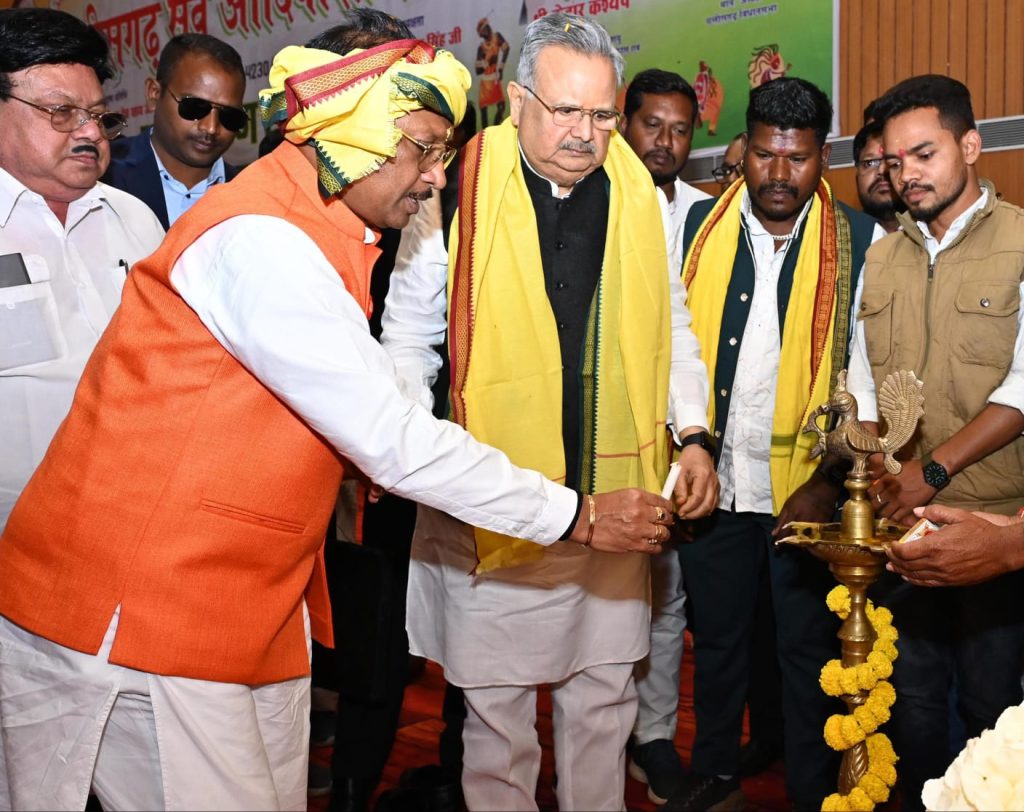Our government is committed to development of the tribal community: CM Sai

Raipur, December 7
Chief Minister Vishnu Deo Sai attended the oath-taking ceremony of the newly elected Executive Committee of the Chhattisgarh Sarv Adivasi Samaj, held at the Krishak Sabhagar in Indira Gandhi Agricultural University Campus, Raipur.
On this occasion, the Chief Minister stated that the government is committed to the development of the tribal community, and all necessary resources will be made available to help them progress. He congratulated all the newly elected office-bearers of the Chhattisgarh Sarv Adivasi Samaj, calling it a prosperous organization with a long history and experience. He expressed confidence that the representatives of the tribal community would efficiently fulfill their responsibilities.
The Chief Minister further stated that today there is a positive environment for the development of the tribal community. Both the Chhattisgarh government and the central government under the leadership of Prime Minister Shri Narendra Modi are committed to the social, educational, and economic development of the tribal community. Both governments care about the welfare of the tribal community.
The Chief Minister also recalled former Prime Minister Shri Atal Bihari Vajpayee, who created the state of Chhattisgarh for the upliftment of tribals. When he was a Member of Parliament, Vajpayee had formed the Ministry of Tribal Affairs. Today, an indigenous woman holds the office of President of India, and in Chhattisgarh, a tribal man is the Chief Minister, which is a matter of great pride.
Chief Minister Sai further emphasized that continuous efforts are being made for the development of the tribal community. Prime Minister Shri Narendra Modi launched the “Dharti Aaba Tribal Gram Utkarsh Abhiyan” on October 2, which will benefit 5 crore tribal people, including several villages in Chhattisgarh. These villages are receiving basic amenities such as roads, electricity, and water.
The Chief Minister also mentioned that there are particularly backward tribes in Chhattisgarh, for whose development the Prime Minister’s “Janman” scheme has been initiated. Under this scheme, essential services and facilities are being provided to these communities. In areas where particularly backward tribes reside, facilities like roads, electricity, ration cards, and Ayushman cards are being made available. Additionally, a new education policy has been implemented in Chhattisgarh, which is employment-oriented. This policy will help children become capable of securing jobs after their education. The “Prayas” institution in Chhattisgarh is doing excellent work to help tribal children succeed in competitive exams.
The Chief Minister further mentioned that in order to support tribal students preparing for UPSC in New Delhi, the number of seats in the Tribal Youth Hostel has been increased to 200. Additionally, Nalanda campuses are being established throughout the state, similar to Raipur, with approval granted for 22 districts. These campuses will enable students from all districts to prepare for competitive exams in their own areas. The Sarguja Development Authority and Bastar Development Authority are also working for the betterment of the tribal community.
Addressing the gathering, Speaker of the Legislative Assembly Dr. Raman Singh said that under the leadership of Chief Minister Shri Vishnu Dev Sai, Chhattisgarh is witnessing rapid development. Today, paddy is being procured from farmers at the rate of ₹3100 per quintal. Under the Mahatari Vandan Yojana, ₹1000 is being given to mothers and sisters. In just one year, the government has implemented several welfare schemes for the benefit of the people.
Agriculture Minister Ramvichar Netam stated that under the leadership of Chief Minister Sai, the government is working for the overall development of all sections of society, including Scheduled Castes, Scheduled Tribes, and Other Backward Classes.
He expressed hope that the Chhattisgarh Sarv Adivasi Samaj organization would become a voice for the marginalized and downtrodden members of society, helping to bring their issues to the administration.
